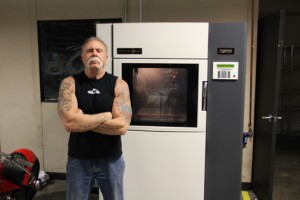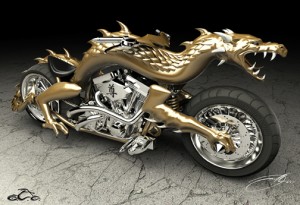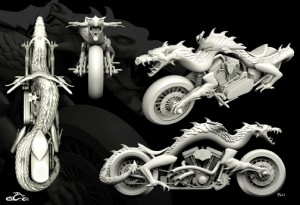Orange County Choppers (OCC) builds custom and production motorcycles in Orange County, New York. Founded by Paul Teutul Senior, OCC was featured on the Discovery Channel’s ‘American Chopper’, a reality TV show that most recently pitted father against son to see who could build the best custom bike. Indeed, OCC is famous for building bikes around a theme, such as the Fire Bike, which commemorated the New York firefighters who died on 9/11, 2001, and it includes a steel rivet from the World Trade Centre.
Custom motorcycles, by their very nature, demand many intricate parts to carry the design theme forward. Most of these parts are produced in volumes of just one to achieve a truly unique bike. In the past, OCC primarily machined these parts from aluminium billets or high-density foam. This approach required considerable time for creating a computer numerical control (CNC) program, producing fixtures to hold the part and machining the part, often on multiple machines. The labour involved added to both lead-time and cost, and the parts could be heavy.
Over the last few years, OCC has begun producing more and more parts for its custom bikes on an industrial grade 3D printer — the Fortus 400mc 3D Production System from Stratasys. “What’s great about additive manufacturing is that you can work with the solid model created during the design process without any additional preparation,” said Jason Pohl, graphic artist and designer for OCC. “You export an STL file and send it over to the printer and go on to your next job. The Fortus produces a perfect replica of the solid model without any operator supervision or tooling. We often use the sparse fill build to substantially reduce the weight of parts.”
Dragon
In response to a customer’s ambitious request, OCC recently designed a bike in the shape of a Chinese dragon. Outfitted with an S&S 100 cubic inch engine and a Rolling Thunder frame, the bike is street legal in China, the customer’s home.
Pohl designed the dragon’s head in 3D Studio Max graphic design software with an incredible amount of detail, including finely stylized horns, teeth, eyelids, gums and nostrils.
“In the past, we would have cut the head out of high-density foam using at least a dozen setups to get all of the undercuts and angles,” he said. “We would have had to scale back the design in order to keep a lid on the time and cost required to manufacture the part.”
With the Fortus, Pohl designed the dragon’s head without worrying about how to produce it. “The Fortus machine captured every detail down to the ribs on the roof of the dragon’s mouth,” Pohl said. “When I put the head on my desk, it felt like it was going to come to life any second.”
To reduce the weight after that first iteration, Pohl created internal voids and printed another copy. The client loved the design, which Pohl created faster and at less expense than was possible with traditional methods.
Pohl concluded: “I am continually amazed by the ability of additive manufacturing to transform my most complex designs into real life.”






